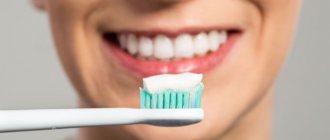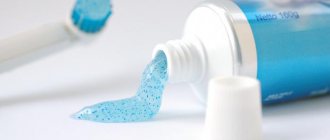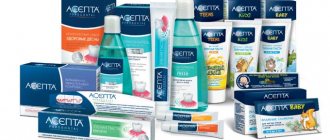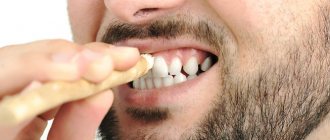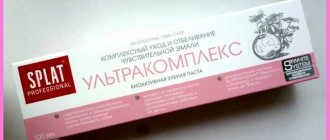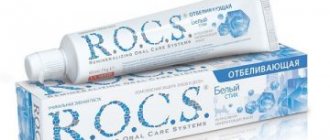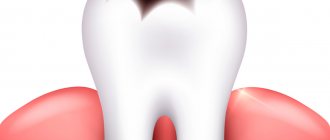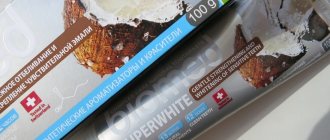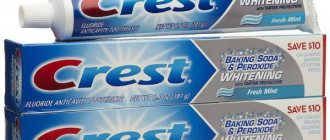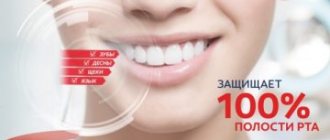What is oxygen bleaching - the mechanism of action and properties of the brightening gel
Oxygen whitening is a teeth lightening method based on the activation of hydrogen peroxide. As a result, oxygen atoms penetrate into the deep layers of enamel and effectively eliminate pigmentation, after which the teeth become snow-white. Hydrogen peroxide also slightly changes the surface structure of the outer layer, increasing its porosity.
The procedure involves the use of a special gel, which contains not only peroxide, but also auxiliary components. Today, for this purpose, preparations with active substances are used, which not only enhance the whitening effect, but also contribute to additional strengthening and nutrition of dental tissues: xylitol, potassium and fluoride.
Oxygen teeth whitening is a modern, effective and safe method.
Causes of yellow tint in teeth
- Healthy teeth in most cases have a yellowish tint due to dentin, which is visible through the almost transparent layer of enamel.
- Teeth become yellower due to deposits that bacteria leave on them. If you eat a lot of sweets and don’t brush your teeth well, you create an excellent nutrient environment in which microbes quickly develop, and they leave plaque on the enamel.
- Color pigments in food, as mentioned above, the way we eat greatly affects the color of our teeth. The most popular products that stain enamel are coffee and black tea.
- ·Bad habits also contribute to weakened dental health, and resins are deposited on the surface of the enamel, adding a yellow, brown or even black tint to it.
- Taking antibiotics and other medications can affect the color of your teeth.
Oxygen teeth whitening will correct yellow discoloration in most of these cases. But remember, if your teeth are not yellow, but gray, or the yellowing is caused by illness and medication, the procedure will most likely not give the desired effect. In this case, the dentist will offer you a more effective solution.
Advantages and disadvantages of the technique
According to numerous reviews from specialists and their patients, this method has proven itself to be an effective and safe teeth whitening technology. Its main advantages are listed below:
- maximum comfort for the patient and absence of discomfort during the procedure,
- safety for mucous membranes and enamel,
- noticeable results after the first session,
- the ability to use the technology at home using special systems for self-whitening,
- high efficiency – the ability to achieve lightening of up to 10 tones in a dental office,
- affordable price.
The photo shows teeth before and after the whitening procedure.
It should be noted that not all people have naturally snow-white teeth. Most often, the enamel has a slightly yellowish or grayish tint. If this is your case, you should not hope for too noticeable results - the effect may not be as significant as you expect.
Among other disadvantages, experts highlight hyperesthesia (increased sensitivity of the enamel), which almost always occurs after the procedure. Teeth may react acutely to mechanical and temperature stimuli, but this discomfort will soon pass. It should also be noted that whitening should not be done in parts, otherwise it can lead to serious damage to the structure of the enamel layer and the development of complications. Some patients note an uneven visual effect, which may be due to the individual characteristics of the structure of hard tissues.
How to prepare for this procedure
- It is necessary to consult a dentist-therapist. The doctor should examine the oral cavity. Identify diseases of the teeth and gums that are an obstacle to teeth whitening. The doctor finds out why the color of the teeth has changed.
- The dentist works to eliminate the identified problems. Sometimes the doctor can fill teeth damaged by caries with a special gel. Which is removed after bleaching is completed before the immediate installation of fillings. Fillings are selected in accordance with the new color of the teeth. After the teeth have been completely treated and whitened, you can begin to polish them. This increases the effectiveness of whitening using Amazing White technology
Indications and contraindications
The main indication for using the system is the desire to sparkle with a beautiful snow-white smile. However, this method is not applicable in all cases. Among the main contraindications to such bleaching, experts identify the following conditions and phenomena:
- During pregnancy and breastfeeding,
- thinning of enamel and its increased sensitivity,
- wearing braces,
- diseases of the oral mucosa - stomatitis, gingivitis, periodontitis, periodontal disease, etc.,
- bleeding gums, regardless of etiology.
If the gums are bleeding, the procedure should not be performed.
It is also worth noting that it will not be possible to achieve the desired aesthetic effect if large fillings or crowns are installed within the smile area. Composites, just like the materials from which prosthetics are made, cannot be lightened. In such a situation, it is better to pay attention to veneers.
Features of ROX whitening toothpaste
The abbreviation in the name of the toothpastes ROCS (ROCS) translates as: “remineralizing systems for the oral cavity.”
Note! The special technology of the whitening effect of toothpastes is based on the process of remineralization - restoration of the layer of tooth enamel by saturating it with minerals.
The manufacturer also took into account the age of the person, developing whitening products separately for children and the elderly.
Their composition is unique, consisting entirely of natural plant extracts and a complex of minerals .
It does not contain strong antiseptics or hazardous substances that irritate tooth enamel, so it is ideal for people with hypersensitive teeth.
Methods of oxygen bleaching
Oxygen bleaching technology is also good because it gives you the opportunity to choose between different options for its application. The procedure can be done in your dentist's office or done yourself using a special home system. Below are different options for using the technique.
Professional systems
Today, modern safe preparations are used as part of professional whitening. They contain components that not only help lighten the enamel, but also additionally provide it with useful minerals and trace elements. One of the most popular such systems is Amazing White.
The technique involves the use of a special composition based on hydrogen peroxide. Moreover, the active substance can be in different concentrations, which allows for an individual approach to each patient, taking into account the characteristics of his particular situation. Using the Amazing White system, you can achieve 7-10 shades of whitening.
Amazing White is one of the most popular methods
Under the influence of a special polymerization lamp, oxygen atoms are released, which interact with pigment particles and remove them. As a result, the enamel becomes noticeably whiter and acquires a vibrant shine. Experts and patients cite the following points as the advantages of this technology:
- high efficiency – up to 10 tones1,
- natural appearance of a smile – the effect of “toilet” whiteness is eliminated,
- safety of exposure to dental tissue due to the ability to control the concentration of the active substance in the composition,
- quick effect - one session is enough for noticeable results,
- preservation of whiteness for 1-2 years,
- affordable price.
It should be noted that the manufacturer offers not only the system itself, but also a wide range of products for oral care and maintaining the achieved result. The range includes whitening toothpastes and rinses.
Home teeth whitening systems
It should be noted right away that home systems allow you to achieve lightening by a maximum of 3-5 tones. For this, there are kits that include hydrogen peroxide-based gel and special mouth guards. The product should be applied to the inner surface of the mouth guards, after which they should be put on the teeth and left for the period specified in the instructions. Depending on the type of system used, the duration of the procedure can vary from 20 minutes to several hours.
When whitening at home, a tray with a special gel is often used.
“I remember once buying an oxygen system for home whitening, and I really regretted it. I personally didn’t like the mouthguard, it was somehow too uncomfortable, I constantly wanted to take it out of my mouth. But that's not the main thing. After the course, the enamel became so sensitive that it became impossible to drink tea or eat ice cream. At first, I even had to take painkillers because eating was too painful. I will never experiment like this again. There’s cleaning, I’ll go for it, that’s enough.”
Victoria03.07, from correspondence on the forum www.32top.ru
Among home oxygen whitening systems, the following brands have earned particular popularity:
- Opalescence PF - available in different variations with gel concentrations of 10, 15 and 20%,
- TresWhite Supreme – gel in concentrations of 10 and 15%,
- TresWhite Orto Mint – the concentration of hydrogen peroxide in the composition is 8%.
As a supportive measure, it is recommended to use whitening toothpastes, but only in courses and in no case on an ongoing basis. Otherwise, too frequent abrasive effects on the enamel will quickly lead to its damage and thinning.
Semi-professional enamel lightening pastes
There is a separate range of dental and oral care products, which are also aimed at maintaining the whitening effect. Among the most popular products are Promedent and ROCS pastes. Their use also ensures thorough removal of plaque, prevention of the development of caries and other dental diseases, and the formation of a protective film on the enamel that prevents it from being stained with food pigments.
Special toothpastes can also be used for lightening
However, it is better to coordinate the use of even supportive agents with a specialist. And you cannot use them on an ongoing basis. Such pastes contain abrasive particles, frequent and intense exposure to which leads to damage to the enamel, its thinning and the development of hyperesthesia.
Consumer Reviews
Olga Shev about Asepta propolis gel (irecommend.ru)
After a tooth was removed, my gums were severely damaged and a healthy neighboring tooth began to wobble. I remembered that in a similar situation I smeared my gums with Metrogyl, but after reading reviews on the Internet, I decided to try an analogue - Asepta gel.
The gel itself is light yellow in color with a pronounced but not unpleasant medical odor.
Mode of application:
After brushing your teeth, you need to apply the gel to your gums 2 times a day, and do not drink or eat for 30 minutes. In the morning, after applying the gel, I do not eat or drink for 1 - 2 hours. And the second time I apply the gel before going to bed, it does not form a film, does not interfere, and there is no unpleasant aftertaste.
EFFECT, PERSONAL IMPRESSIONS:
In just a couple of days I felt improvements: my gums began to heal, my teeth stopped loosening.
But! A month later, there is still a problem with the mucous membrane that does not want to heal. The instructions say that the gel should be used for 7 - 14 days. I haven’t used Asepta yet, I’m waiting for it to heal on its own, since I’ve been smearing it on my gums for more than 2 weeks.
I would like more from this gel, but nevertheless it has a beneficial effect, so I recommend purchasing and using it.
kristiagata5 about Asepta Plus Gentle Whitening toothpaste (otzovik.com)
“I have very sensitive teeth, they react to literally everything. Today I tried to brush my teeth with the new ASEPTA Gentle Whitening toothpaste and was pleasantly surprised. Compared to the previous Asept paste, this one has a pleasant taste of chewing gum from my childhood. The paste is very tasty, refreshes the mouth well, leaving a pleasant smell for a long time and, moreover, did not irritate my very sensitive gums, which I am incredibly happy about. As for the whitening properties, we will see with further use, since it is impossible to assess this point the first time. Overall, I really liked the pasta. Many thanks to the producers."
BatGirl about the Asepta Active mouthwash ( otzovik.com ):
“In this review I’ll tell you about a mouthwash that has helped me out more than once. This is Asept Active mouthwash. In general, Asepta has two types of rinses: Fresh, which is designed to freshen the mouth, and Active, which should be used for bleeding and gum diseases, such as gingivitis, periodontitis and stomatitis...
...When rinsing, I don’t feel anything other than freshness. But after it, a strong numbness is felt on the gums and tongue - this is a phenomenon that you need to get used to.
Asepta Active has helped me out many times:
- for bleeding gums, especially if used in conjunction with Asepta medicated toothpaste;
- Sometimes I forget and brush my teeth too hard, rubbing my gums. In this case, Asepta quickly relieves inflammation and eliminates discomfort;
- When I have acute respiratory infections or the flu, my teeth and gums often ache—asepta is a good pain reliever in this case;
- I use this mouthwash for sore throats, as it has an antibacterial effect - I just rinse my mouth with it. Undoubtedly, for sore throats, I use the rinse in complex treatment, together with drugs for sore throats;
- Well, the most wonderful property of this mouthwash is that it helped me out at the moment when my wisdom teeth were cutting through. And this happens to me with pain, inflammation of the gums around the tooth, and sometimes even with the formation of swelling on the cheek. Here asepta acts comprehensively: it relieves inflammation, swelling, gives an analgesic effect and soothes the gums. With daily use, on the third day I almost forget about my wisdom tooth.
In general, we can say that Asepta Active mouthwash is universal and helps with many problems in the oral cavity.”
How the procedure is performed in dentistry - technique and recommendations
Immediately before the procedure, you should visit your dentist and make sure you have no contraindications. You will also have to undergo professional cleaning to remove plaque and deposits, heal caries if present, and replace old fillings. If whitening is carried out in a dental office, the procedure will follow the following scheme:
- the doctor isolates the gums with a special material, after which he coats the teeth with a composition based on hydrogen peroxide,
- a laser or UV lamp is used to activate the active substances,
- Upon completion of the procedure, the specialist removes the remaining gel and removes the insulating material.
Before the procedure, the specialist isolates the gums and applies a special gel to the teeth.
After whitening, it is recommended to limit the consumption of drinks and foods with intense coloring pigments. These include coffee, red wine, strong black tea, berries, sauces, juices, beets, etc.
The maximum effect can only be achieved in a dental office. In this case, the smile can become 8 or even 10 shades lighter. Home systems allow you to achieve lightening of up to 3-5 tones, but before using them you still need to consult with a specialist.
1According to data at the office. website: amazing-smile.com.
What happens if you continue to smoke after teeth whitening?
Gentle methods of teeth whitening for people who have the habit of smoking will not be effective, so dentists recommend using modern hardware techniques, such as Zoom or professional laser cleaning.
After professional whitening, tooth enamel will be somewhat thinned, the protective layer will weaken, and tooth sensitivity may increase. Such consequences are natural, given that the teeth were exposed to external influence. However, after a few days the condition of the tooth enamel will be restored. To strengthen it, you can additionally do fluoridation or remineralization.
After teeth whitening, you can smoke, but you should understand that all the substances of tobacco smoke will instantly penetrate the unprotected tissues of the teeth and cause damage to them, which will be difficult to eliminate. The aesthetic effect will be reduced to nothing. Immediately after bleaching, 2-3 cigarettes will be enough for the enamel to reacquire a pronounced yellow-brown tint.
Many patients believe that hookah can be smoked after teeth whitening, because it is not cigarettes. But this is not true at all. For hookah, tobacco is also used, which also contains chemical components and tobacco leaves. The smoke that is inhaled through the pipe will contain combustion products and the same resins that stain tooth enamel. For this reason, dentists definitely do not recommend hookah after teeth whitening.

